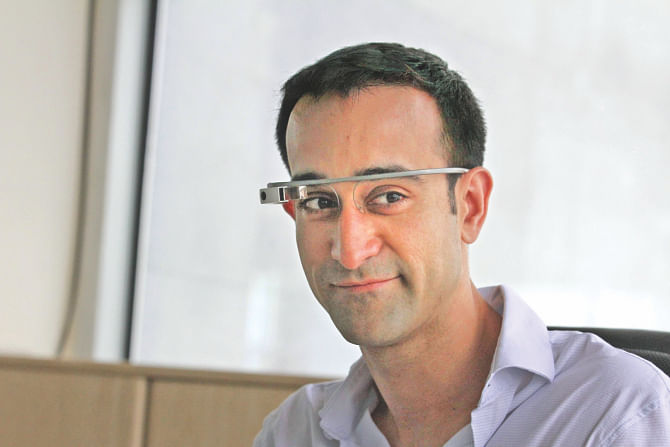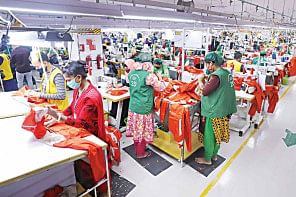Good news via Google Glass

A startup serving doctors in the US with patient recordkeeping in real-time via Google Glass plans to employ 7,000 Bangladeshis for its backend office in Dhaka.
Ian Kazi Shakil, chief executive officer of San Francisco-based Augmedix, has set up its office at Panthapath where 45 young Bangladeshis are building the solution that allows patient documents to be entered into the US government-mandated electronic health records (EHRs) without manual data entry by doctors.
The company -- founded in 2012 by Stanford graduates Shakil, whose father is a Bangladeshi and mother an American, and Pelu Tran -- currently provides the service to doctors in 10 states in the US.
By 2018, Augmedix plans to hire more than 7,000 people in Bangladesh. Rapid scaling of the team will begin in early 2016, in conjunction with Augmedix's select Business Process Outsourcing partners, Shakil told The Daily Star in an interview in Dhaka on February 8.
With a Google Glass app, Augmedix employees at the back office remotely sit in on live conversations between doctors and patients and enter the data into the EHRs, relieving the doctor of doing it manually whilst talking to a patient. The system also allows doctors to call in patients' records to be displayed on the Google Glass screen before his or her right eye.
Manual data entry into EHRs by doctors degrades the patient-doctor interaction.
“Physicians are no longer able to focus on what matters most: providing patient care,” said Shakil. “Doctors hate it, and the patients don't like it either when they have to look at doctors' backs as they type or run away because they have no time. We make a service for doctors that eliminates the biggest pain point in their lives, the fact that they spend a third or more of their day documenting and charting in electronic health records.”
When doctors wear the Glass and use the service, they don't spend a third of their day in front of the computer and almost all of that time is reclaimed and redirected to patient care, said the 30-year-old, who studied biomedical engineering at Duke University and received his MBA from Stanford Graduate School of Business in 2012.
“Doctors can have natural conversations with their patients. From the audio-visual of that conversation, we're able to extract structured data and put it right into the EHR in real time.”
After patient data is in the EHR, the Augmedix solution serves doctors with information on demand. Doctors can simply say “show me the labs,” or “show me the cholesterol,” and the results of their queries pop right up.
“From an efficiency standpoint, we turn three doctors into four,” said Shakil. "Our system has made doctors' lives easier while improving efficiency and accuracy in medicine.
“Now patients are happier because they receive more attention. Doctors are happier because their lives have become easier and they can devote more time to their patients and families,” Shakil said.
Doctors pay Augmedix a monthly fee and in return, the company gives them everything they need: Google Glass, implementation, the accessories, the service, and the support.
At present, Augmedix has more than 150 employees worldwide, and plans to significantly expand its workforce in 2015.
So far, more than 25,000 patients in the US have seen doctors using the Glass-based service. The company plans to serve 1,000 doctors by the end 2015.
Eventually, Augmedix wants to expand its services to doctors all over the world.
Bangladesh could be involved in the transformation of healthcare even in the early days, because the company's software engineering team and much of its operations team is based in Dhaka, said Shakil.
Shakil said it would take more time to bring the service to Bangladeshi doctors, who haven't yet adopted modern electronic health records in large numbers. But as the cost of the Glass comes down and the service gets more efficient, he believes Augmedix could begin serving doctors outside of the US and eventually in Bangladesh.
Augmedix is backed by established Silicon Valley venture capitalists Emergence Capital and DCM. The startup is different from many others in that it isn't purely driven by profits; it also considers itself to be a “mission-driven” organisation that strives for positive impact in the world.
Shakil's advice to young entrepreneurs in Bangladesh is that there has never been a better time than now for a startup in the country because the tools to develop software and go-to-market are easily accessible online and are mostly free.

 For all latest news, follow The Daily Star's Google News channel.
For all latest news, follow The Daily Star's Google News channel. 



Comments